
Moving halfway across the world isn’t the only way to reap the benefits of exchange programmes. Virtual exchange programmes — where participants connect with peers and institutions from anywhere in the world — achieve the same perks, like meeting new people, breaking down tired cultural stereotypes and bringing classroom learning to life.
Sure, you won’t be able to sit on a “terrazza” to sip an espresso as stylish Milanese stroll by or go to a Lakers game — but you’ll save money, time and the hassle of jumping through bureaucratic hoops to get a visa. Virtual exchange programmes can be a pretty sweet deal — here are five we recommend:
Evolve
Evidence-Validated Online Learning through Virtual Exchange is a project for collaborative international learning across higher education institutions in Europe and beyond. Students can take part in computer-mediated learning from remote classes and work together online on tasks developed by educational facilitators.
 A woman uses her laptop computer as she lounges in Greenwich Park, southeast London.
A woman uses her laptop computer as she lounges in Greenwich Park, southeast London.
World Learning
Their virtual exchange programmes aim to build a better future for all people through education, sustainable development and exchange. They conduct courses with communities and institutions to find solutions to world problems such as poverty, conflict and inequality.
Stevens Initiative
This organisation supports projects across the US, Middle East and North Africa. One of them — Enactus Morocco and Enactus US’s Entrepreneurial Exchange — offers a virtual course on entrepreneurship that culminates with a project pitch competition between 10 cross-country, cross-culture teams.
United Planet
This programme is open to middle and high schools in diverse locations where they connect and collaborate to learn about each other, their communities and modules by United Planet. This creates a learning environment that supports skills in real-time.
Virtual Exchange Coalition
As a people-to-people education programme, Virtual Exchange Coalition is combining cross-cultural exchange with the broad reach of new media technologies for young people to learn about each other.
In partnership with the Saxelab Social Cognitive Neuroscience Laboratory at the Massachusetts Institute of Technology, the Exchange 2.0 Coalition was established for more evidence-based measures of educational impact for students in grades K-12.










